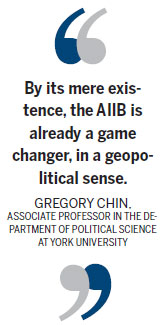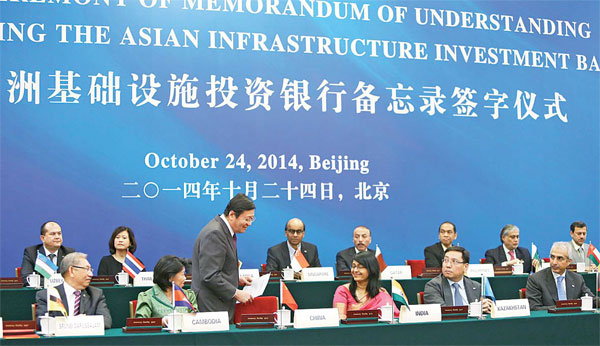Push for greater role in economic decision-making
Updated: 2015-11-13 08:12
By Fu Jing(China Daily Europe)
|
|||||||||||
When President Xi Jinping meets other world leaders at the G20 summit in Turkey on Nov 15-16, he will be able to present them a glowing report card on China's performance in responsible global governance since the last summit a year ago.
Not only that. As China prepares in the Turkish coastal city of Antalya to take over the presidency of the G20 next year, Xi is likely to set out his country's intentions for making the organization a stronger advocate for improving global governance.
Central to that plan is Xi's Belt and Road Initiative, which countries and regions across the globe, including in Eurasia, Central Asia and Europe, and stretching from Indonesia to Pakistan, Belarus, Russia, Belgium, France and Britain, have endorsed to better connect Asia, Europe and Africa.
|
The G20 summit will be held in Antalya, Turkey, on Nov 15 and 16. Photos provided to China Daily |
|
From Left: Gregory Chin, associate professor in the department of political science and faculty of graduate studies at York University in Toronto; Fredrik Erixon, director of the European Center for International Political Economy; Dennis Pamlin, founder of the 21st Century Frontiers. |
Russia has agreed to integrate its initiative of a Eurasian Economic Union with Xi's plans, and five other members of the Shanghai Cooperation Organization have endorsed China's initiative. The European Union is seeking convergence between its 315-billion-euro ($380 billion) investment plan and China's connectivity proposal, and they are planning to launch a joint investment fund.
More than 50 countries have already signed on to become founding members of the China-led Asian Infrastructure Investment Bank, whose headquarters will be in Beijing. China has also said it is willing to become a member of the European Bank for Reconstruction and Development, whose headquarters is in London.
In July, the New Development Bank, its shares split equally among the five BRICS countries - Brazil, Russia, India, China and South Africa - was launched in Shanghai and will open for business within the next six months.
Indian banker Kundapur Vaman Kamath has been appointed president, and it will set up an African regional center in Johannesburg soon. It has taken about three years to turn the concept of such a bank into reality.
Over the past few months, Beijing has been working overtime to obtain support for its ambitions to change the way the international economic regime works.
Perhaps not surprisingly, China's efforts in pressing ahead with its plans have not come without resistance, much of it from the United States, which is reluctant to cede its dominant role and give China and other developing countries a greater say in running the world financial system.
The country's resolve to press on, acting as standard bearer for the developing world, has impressed China observers.
Gregory Chin, associate professor in the department of political science and faculty of graduate studies at York University in Toronto, has long watched China as it has reasserted itself internationally over recent years.
"China's lead role in the creation of the Asian Infrastructure Investment Bank and the BRICS New Development Bank and turning the Belt and Road Initiative into action are all signs of a new China, of (its) bold new economic statecraft," Chin says.
Chin, who has worked at the Canadian embassy in Beijing, has attributed China's enthusiasm in pushing for such bold changes globally to its desire to speed up reforms of global economic and financial regimes and domestic systems at the same time.
At home, for the past three years, Xi has pushed ahead with market-oriented reform, and there has been no let-up in a campaign to rid the country of endemic official corruption.
"The primary motivation behind the new diplomatic moves and institution-building is the desire of the current Chinese leadership to encourage some fundamental changes inside China, and at the same time to take a more bold stance on the global stage," Chin says.
"China's current leaders see these dual transformations, domestic and international, as part of a whole process of change that is essential for keeping China on the path of strong and sustained growth and development.
"Externally, the new international arrangements can be beneficial to the international partners if they are rooted in sound developmental practices."
Dennis Pamlin, founder of the 21st Century Frontiers, a consultancy company in Sweden, says that to define the New China he prefers the terms "proactive" and "ahead of the curve".
Nevertheless, it was not until recently that China had assumed or resumed a role in almost all international institutions. It has been a well-behaved newcomer, Pamlin says.
In 1971, the People's Republic of China assumed its place in the United Nations and in 1980, it became a member of the World Bank. Another international body that China joined, in 2001, was the World Trade Organization.
"Now, China is increasingly helping to improve structures and has even begun to create new structures," Pamlin says.
"I would argue that this change is natural as China now has the experience required to understand current structures as well as the capacity to develop new ideas."
Fredrik Erixon, director of the European Center for International Political Economy, a think tank in Brussels, says whether a new New China can be defined is irrelevant.
"It is important that China is in the process of building its own idea about institutions and policies for peace, security and prosperity in the world. China is not a missionary power, but it has acquired a lot of interest in maintaining a world order based on rules and a structure of power which makes all other countries turn to China for responses, if not for leadership."
But exactly how China will balance competing schools of thought about its own attempts to fashion a regional or global order remains to be seen.
"But it should start from the historical fact that a rising power has far more use for global institutions and rules than declining power."
Constantine Papadopoulos, former Greek minister for international economic relations, says China is following a rational approach well suited to current historical circumstances.
"Having achieved the status of an economic superpower at a time in history when other - mostly Western - nations are already occupying the top rungs of the economic-development hierarchy, China needs to tread carefully with the sensibilities of the hitherto dominant powers.
"So by offering win-win opportunities to other countries and by seeking to contribute to their development by way of explicitly cooperative business proposals, it is doing the sensible thing."
China's ambitions in the area of global development through huge infrastructure investments to be financed by the AIIB and the BRICS bank and other projects are truly impressive in their scope, size and reach. Again, the political reactions to these projects will ultimately depend on the impact on the economies of the countries most affected.
Papadopoulos believes that many will be affected, whether directly or indirectly: the economies along the land and sea routes envisaged in the New Silk Road initiative account for 63 percent of the world's population and 29 percent of global GDP.
"If all goes according to plan, those countries will probably see net benefits fairly rapidly. But as development is not a containable process, reactions, understandably, will occur further afield as well."

Papadopoulos says that the West, after years of advocating liberal economics based on fair competition, a more productive division of labor, expanding markets and the resulting prosperity for all, now feels its primary position challenged.
"However, I think that the West can overcome its fears if China manages to prove that it is a credible and reliable partner and not a dangerous rival that threatens to take away the prerogatives of the West, proving, in fact, that Western liberal economic thinking is not only for the West, but has, indeed, universal reach."
China no doubt sees the AIIB as a useful vehicle for exercising greater economic influence not only in its region, but globally, Papadopoulos says.
The frustration of China and other emerging economies regarding changing the way the IMF is run, by way of stalling in the US Congress, of an agreement to increase the resources of the IMF and raise the voting shares of fast-growing emerging markets, is well known.
"It is widely acknowledged that Washington mishandled the AIIB issue further when it tried, unsuccessfully, to dissuade some of its European and Asian allies from joining," Papadopoulos says.
"This attempt gave the impression that the emergence of the AIIB was, for Washington, an 'us or them' issue, when, clearly, for Asian and European countries it was not."
Chin says the AIIB, with the Belt and Road, and the BRICS New Development Bank, all signify China taking a more proactive role in international governance, and even in regional and global leadership.
"By its mere existence, the AIIB is already a game changer, in a geopolitical sense," he says.
Chin says this is because for recipient countries it is an alternative to the Asian Development Bank, because the AIIB's membership extends beyond Asia, and because the AIIB will set precedents that have implications for the World Bank and other regional development banks beyond Asia.
"But to be a more profound game changer, in terms of bringing true developmental benefit to its recipients, the real challenges lie ahead," Chin says.
Most importantly, he says, the AIIB must be based on financing and assistance policies, lending practices and standards that are deemed useful and just by the recipients as well as the donors.
"This is a serious challenge, as the existing lenders can tell. Also, the AIIB would need to be based on more effective, efficient and equitable internal governance and operational arrangements than those that exist in the established organizations."
As China has taken an ever greater role in tackling global problems, the response from the world has been mixed. Belgium, for example, stood impassively by earier this year as its Western European allies became founding members of the AIIB, but has now entered the application process.
About half of European countries and the European Commission have applied to be part of the new institution.
"There are divisions around in Europe, but I don't think they are infectious," Erixon says. "European countries are on board and they will participate, albeit as junior partners. The European Commission has neither the resources nor the legal platform to join the AIIB, so that should not be surprising."
Chin says Europe now seems to be split in three: those that see China as a threat to so-called European ways; those that see engaging China more as an opportunity and a necessity, especially given the shifts in the balance of global economic and political power, despite any risks to "European ways"; and those who see China still mainly as an opportunity, but also as a potential medium-term threat to the economic and political interests of the powerful inside Europe, as China's presence expands in Central and Eastern Europe, as well as in Western Europe.
Pamlin says opinions on China's leading role in Europe are divided.
"I think most welcome a more balanced international system and a more proactive China. The reason for the lack of interest in many cases has more to do with internal struggles where many European leaders struggle at home. With the tensions within the EU, many feel it is best to focus on solving the internal crisis before engaging more in initiatives like AIIB."
As to how China could perform an even greater role globally, Glyn Ford, a former member of the European Parliament who has observed China for years, says the country's rising power and global influence is self-evident but it needs more work in communication.
"Despite the efforts of the recent years, China's public diplomacy performance is still lacking. It is very difficult for China to depart from its very rhetorical and standardized way of communicating; this hampers China's diplomatic efforts. And this should be the challenges Beijing faces in further boosting its global influence."
Pamlin says China has been highlighting the benefits of collaboration, but he still thinks there is room for more win-win approaches, not the least when it comes to the role of civil society in global governance processes.
"I think it is important to understand that all significant change will meet with obstacles. This is not necessarily a bad thing. What will be an important balance to strike for China is to pursue initiatives that help China address the challenges of its new modernization phase."
China will go through restructuring at a time of demographic changes and environmental pressures, and technology will change faster than ever before.
"On the other hand, the way China engages in global challenges will also shape the future of the world," Pamlin says. "These are big words, but it is true. How China will approach this role will be crucial."
Instead of the "one-man show" that the US has pursued, Pamlin says, the world needs dialogue and a network-focused China.
"This is very much along the lines China has acted so far, but we need a China that helps put global challenges on the agenda."
Pamlin says there is a unique opportunity for China during the G20 presidency next year to initiate a global forum to tackle global risks through collaboration.
"Instead of only identifying problems, China could set up a process where a global risk initiative delivers suggestions for how these risks can be turned into drivers of innovation."
fujing@chinadaily.com.cn
|
The memorandum of understanding is signed on establishing the Asian Infrastructure Investment Bank on Oct 24 last year in Beijing. China observers think the country is taking a more proactive role in international governance. Provided to China Daily |
(China Daily European Weekly 11/13/2015 page9)
Today's Top News
China's migrant population expected to reach 291m by 2020
China sends more currency overseas to meet demand
Little Chinese speakers hatch in UK's first bilingual nursery
China mourns death of former German chancellor
Former envoy recalls 'China hand' Helmut Schmidt
Alibaba breaks sales record on Nov 11 shopping spree
Britain's Cameron appeals to EU reform doubters
October inflation eases to 1.3%, producer prices fall again
Hot Topics
Lunar probe , China growth forecasts, Emission rules get tougher, China seen through 'colored lens', International board,
Editor's Picks

|

|

|

|

|

|









